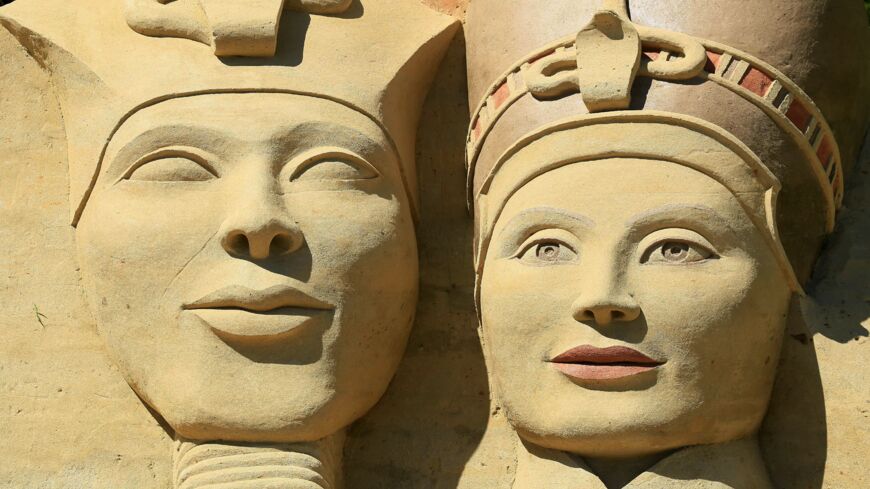Egypt resumes hunt for Nefertiti's tomb amid historical debate

CAIRO — Egypt's archaeological mission, led by famed Egyptologist and former Antiquities Minister Zahi Hawass, resumed on Dec. 9 the hunt for Queen Nefertiti's tomb in the west bank of Luxor after years of debate over her burial site.
Hawass told Al-Monitor by phone he believes Queen Nefertiti is resting in the Valley of the Kings in the west bank in Luxor. He said an Egyptian team has been formed to search for and excavate the tomb.
"The team of Egyptian archaeologists tasked with finding Nefertiti's tomb was formed in 2017 and is an entirely Egyptian mission. This is the first time that an Egyptian mission leads [the excavation] works at the archaeological site of the Valley of the Kings, where foreign missions have always worked," Hawass said.
Controversy and division over the whereabouts of Queen Nefertiti's tomb have prevailed among archaeologists for years. In August 2015, Nicholas Reeves, an archaeologist at the University of Arizona, claimed Nefertiti may lie behind a wall within Tutankhamun's tomb.
The BBC reported in August 2015, "The whereabouts of Nefertiti's remains are not known, although those of Tutankhamun were found in 1922."
In October 2015, the Egyptian Ministry of Antiquities formed a scientific committee led by then-Minister of Antiquities Mamdouh el-Damaty to hold an objective discussion in the Valley of the Kings in Luxor with Reeves, who said Nefertiti's tomb might be located behind the north wall of Tutankhamun's tomb. The Egyptian Ministry of Antiquities conducted a radar survey of Tutankhamun's tomb in November 2015, but it did not confirm what Reeves said.
In May 2018, the ministry dismissed Reeves' theory about the tomb and said the monthslong geophysics studies by the team of researchers at the Polytechnic University of Turin in Italy ruled out any hidden rooms behind the walls of Tutankhamun's tomb. This means that Nefertiti's tomb was not found.
Hawass said, "There is no scientific evidence proving the theory that Queen Nefertiti was buried inside Tutankhamun's tomb. We believe that Nefertiti could be buried in the western valley next to the tomb of King Amenhotep III."
"There are still a lot of undiscovered secrets about ancient Egyptians in the area located between King Amenhotep III's tomb and King Ay's," Hawass added. Locating Nefertiti's tomb would be "the most important archaeological discovery in the world, and even the discovery of the century," he said.
Hawass said in a lecture at the National Museum of Egyptian Civilization on Dec. 8 about the recent archaeological discoveries that "evidences in the west bank (in Luxor) show that there are antiquities that match those found among the amulets belonging to King Tutankhamun, the son of Akhenaten, Nefertiti's husband."
Hussein Abdel Baseer, director of the Antiquities Museum at Bibliotheca Alexandrina, told Al-Monitor, "Queen Nefertiti is the beautiful and smart wife of King Akhenaten. She supported him greatly and was one of the strongest supporters of the new religious call that he made to worship the new god Aten. She is one of the most famous queens of ancient Egypt and the lady of the Amarna period."
He added, "There are some studies that indicate Queen Nefertiti co-reigned with her husband. Recent studies, however, stated that King Akhenaten ruled alone and that Nefertiti may have assumed power after his death. Too many mysteries and questions continue to surround this queen's life in general."
Egyptian historian and Egyptologist Bassam al-Shammaa told Al-Monitor by phone, "There are many hurdles to the discovery of Nefertiti's tomb, given her mysterious life about which only a little was revealed. It is said that ancient Egypt's most famous figures are the most mysterious ones."
Shammaa added, "I doubt that the [team] will find the mummy and the original tomb of Nefertiti in Luxor for religious and political reasons, most notably among which is the enmity with the priests of Amun-Ra after her husband Akhenaten called for worshipping the god Aten and she supported him. This resulted in problems and pushed them to abandon Thebes (in Luxor), the capital of ancient Egypt, and to build a new capital in Amarna."
He explained, "Finding Nefertiti's tomb in the west bank in Luxor is only possible if the mummies of Akhenaten and Nefertiti were moved from Amarna to Luxor in later eras." He called on the ministry to expand the archaeological team searching for Nefertiti and to involve more scientists who specialize in hunting and locating tombs.
Commenting on the possible historical value of the discovery of Nefertiti's tomb, he said, "Finding Nefertiti's mummy, and what's in her tomb, by the Egyptian team would be tantamount to the rewriting of history, particularly since that tomb has preoccupied everyone for hundreds of years."
-- Sent from my Linux system.
No comments:
Post a Comment